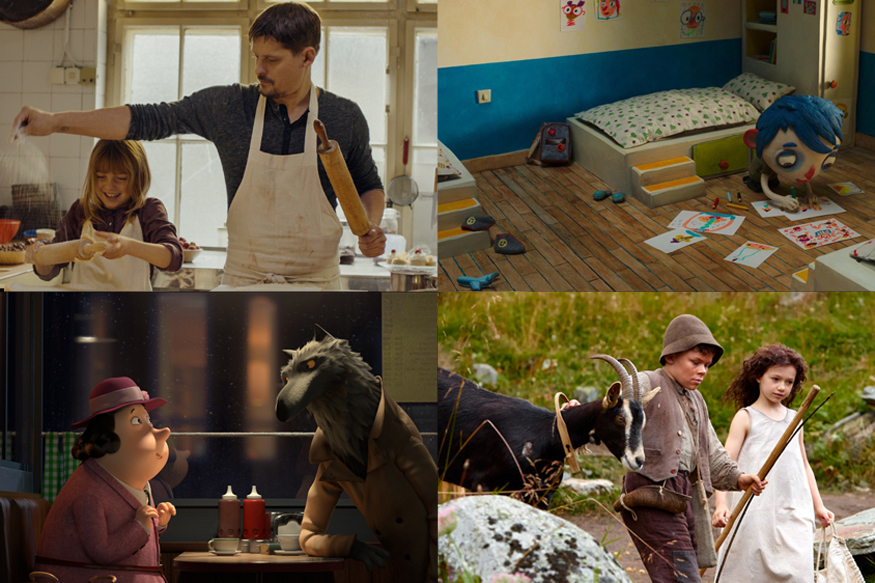
views
Ten-year-old Toda lives in one of the finest patisseries in an unnamed town with her father and grandmother. She knows everything there is to know about cakes and pastries; all seems well until the day her father is called to fight in a war. Toda’s tale thereafter turns into an engaging adventure as she sets off to find her mother. Meanwhile, on another screen, there’s a five-year-old orphan Heidi who resides with her goat herding grandfather in the Swiss Alps. Her life turns upside down when her aunt Dete takes her to Frankfurt where she is to take care of a sick child Klara.
Both women, both young, both making sense of the weird, wide and wonderful world outside and their thoughts inside.
Nicole Van Kilsdonk’s The Day My Father Became a Bush and Alain Gsponer’s Heidi happen to be just two among the many endearing children’s films screened at the recently concluded Dharamshala International Film Festival in the foothills of Himalayas. And while many are of the view that children prefer animated content and that ‘artistic’ films are only meant for a particular age group, the number of school kids and adults who queued up for these films at the four-day festival is enough to bust that particular belief.

Monica Wahi, Director of South Asian Children Cinema Forum and a children’s media specialist, who also curated the line-up of children’s films, shared that such notions exist because of the lack of exposure to fine articulate content.
“Many people have this notion because what they regard as children’s films are the animation content they watch on television. The only films they’re used to are those that are a part of Disney content. And I’m not dissing them. Those are great films but they are made for a certain kind of commercial exploitation. In fact, they do not try to grapple with more complex issues and don’t explore the artistic side of cinema," she said, adding, “So once you get exposed to that kind of children’s cinema, you’ll never be able to say that it is only meant for children in a disparaging manner."
Wahi further explained how vital it is to feed the right things to children in terms of content, as perhaps that’s the age that truly molds their thoughts and actions.
“Children are way wiser than adults because their innate wisdom hasn’t been dumbed down or distorted or suppressed. As we grow, we become more and more desensitized. Children also learn from observing things and from their experiences. To help them grow -- in facing challenges, encountering and learning from them -- it is important they encounter literature, films which would expose them to various kinds of communities, ways of living and through those fictional characters, they might get over their own fears."
Her recommendation to parents, however, remains that one shouldn’t watch any films in their first 10 or at least seven years. “To appreciate good cinema, you should first read. You should first do something tactile with your hands and then only you’ll understand because, in the end, cinema is coming together of all of that," she said.
“But unfortunately everybody watches and we cannot stop children from watching what they want but as parents and educators, we can open this other window for them. If you expose them from the very beginning to artistic kinds of work, then they’ll themselves build that appetite and tomorrow they themselves might say oh that Chota Bheem or Kapil Sharma show isn't worth it," she added.
On being asked about the existence of children’s cinema in India, she expressed that one can’t address it as an industry, saying, “Bollywood itself caters to a particular kind of mentality- because there’s song, dance, and action; parents end up taking children to those. Children cinema should also be seen as a part of a larger independent movement. Naturally, if there’s no space for independent cinema, where will there be space for children’s cinema?"
She highlighted the fact that in the past eight to 10 years, there have been good films being helmed every second year. But because of the lack of efficient production and distribution practices, they struggle to grab the eyeballs and at times, a decent space in the theaters too.
“You have some distinctive films every two years and these are mostly being made by some brave producers who are ready to back the content. But at theaters, there are very few who have succeeded to recover the money," she noted.
“Even if the films get critically acclaimed and even if they get houseful shows on weekends, the theatre owners can still take those films out because there’s no regulation. They can take it out thinking they’d do better with another film. So unless the distribution part is sorted out, very few producers will back films like that," she opined.
Wahi also pointed out that while the advent of technology makes her hopeful for a better future, the games of profit and loss can still prove a hurdle in the way of good content. “When the same channels work in other countries, they will work very differently and will probably not show what they show here. They will be much more inclusive. How many children television series do you have which shows a girl as the main protagonist? It’s very rare and then we talk about how society looks at girls in a certain way and sexual harassment on the streets. It’s a particular South Asia problem that we’re concerned more with profit and losses."
At a festival which brings to mountains a finely curated collection of independent films, Wahi’s choice of films was based on a four-pronged approach of whys and wherefores. “I look for films which are able to somehow challenge the children, something that connects with them emotionally and endures with them, something that makes them look at the same thing with a different perspective and something that makes them self-reflect and question the stereotypes."
She also shared that films which teach children to compete and not to share, or that look at any gender, caste, community, religion, and disability in a patronizing way, would never fit the bill.
“As a curator, you curate not just on the merit of the film but also on your audience. So one is to be able to promote good films and therefore encourage those filmmakers and expand that space for them but the magic happens on how the audience interacts with the film. Only if a film makes you self-reflect, can you cross boundaries."
Suresh Eriyat’s Tokri, Claude Barras’ My Life As a Zucchini and Jakob Schuh and Jan Lachauer’s Revolting Rhymes were some other films that were screened at the festival.



















Comments
0 comment